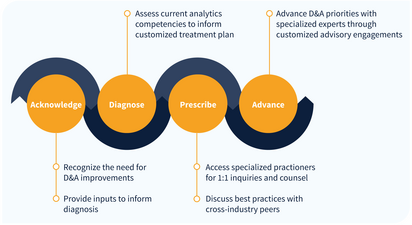Client Inquiry:
Our program management office is building a data literacy program for our core data and analytics team. Could we get some feedback on our approach?
Expert Takeaways:
Good Communication
The data and analytics team needs to bring value to the business, which means teaching them how to interact with business partners. Business partners know little or nothing about data.
- When the business comes asking for data, the answer is always, "Help me understand what you're trying to achieve so I can better meet your needs." Never, "Yes, I can provide the data" or "No, I can't."
- Focus on data storytelling. The analysts know data, but most of the time they have never been taught how to communicate data effectively to different audiences.
- Teach the team the language of analytics engagement. Business leaders will love it if the analysts take time upfront to ask questions and understand the business context, and get it right the first time.
- Provide a list of how to have the conversation. Be explicit. Give analysts actual tools—pieces of paper—with phrases written down.
The analysts' job isn't what they learned in school—algorithms, programming, and everything technical. These are tools they use to solve problems. Their job is also not about pulling and summarizing data. This is work they do for themselves as part of their workflow.
- An answer for the business partner isn't 50 pages of statistical analysis; it's a one-page slide. The partner doesn't need the data details. When an analyst hands over 50 pages of data, they're asking the business leader to do the analyst’s job.
- If analysts are unable to provide conclusions / actionable insights to the business, they need to work on their analysis skills or work with the business to understand the problem better.
Business Takes Action
Since analytics work is meant to impact the bottom line, it matters whether or not the business takes action on insights. So, communication around data literacy applies to business partners as well as the analytics team.
- Communication with business partners involves assessing whether they're poised to make decisions and take action. They need to understand that the analyst's job stops at providing insights and informing solutions.
- Part of the learning includes understanding that the analytics team isn't going to continue with analytical work that won't be acted upon. Analytics is a business utility that's not separate from the business. Analytics sits at the table just like the HR and finance partners.
- The analysts can estimate the value of the work and ask business leaders if they have the resources they need to take action. If the answer is no, then the idea goes on the shelf.
- Initially, the business may not understand what it means when analytics provides a potential solution. The business needs to ingest it and decide whether taking action is worth it. It's their call.
- Ideally, the analysts are dotted-line members of the business teams. They work for the business. The business sets the priorities and strategies.
Measuring Impact
Success centers around how useful the analysts are to the business leaders and how well the business leaders engage with the analysts.
- You'll know the analysts have stronger relationships with the business leaders when the leaders begin to call analysts directly and copy the analysts in messages.
- You can assess how the analysts answer the question: What are you working on and what is the business partner solving for? That is, analysts should understand the business context.
- The end goal is improving how these two groups work together. Are they calling each other? Are they speaking directly? Is the analyst attending the business' staff meetings? Does the business copy the analyst on emails? Is the analyst a team member similar to an HR partner?
“With the help of IIA Experts we were able to get multiple relevant perspectives on our issues quickly and efficiently without need for engaging expensive consultants.”
Expert Network
IIA provides guided access to our network of over 150 analytics thought leaders, practitioners, executives, data scientists, data engineers with curated, facilitated 1-on-1 interactions.
- Tailored support to address YOUR specific initiatives, projects and problems
- High-touch onboarding to curate 1-on-1 access to most relevant experts
- On-demand inquiry support
- Plan validation and ongoing guidance to advance analytics priority outcomes
- Monthly roundtables facilitated by IIA experts on the latest analytics trends and developments
